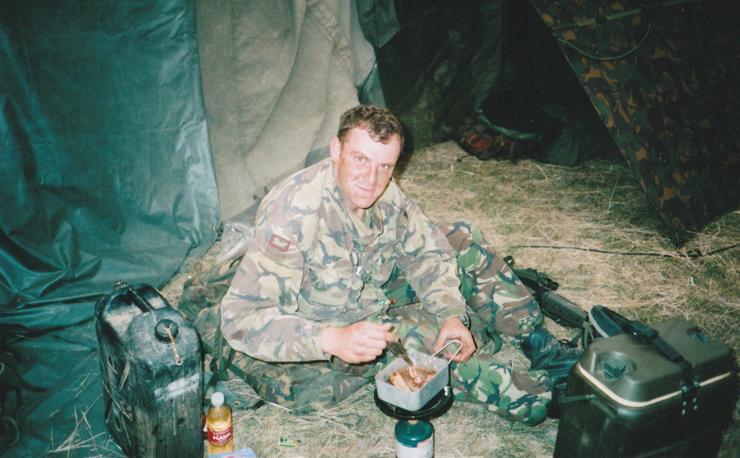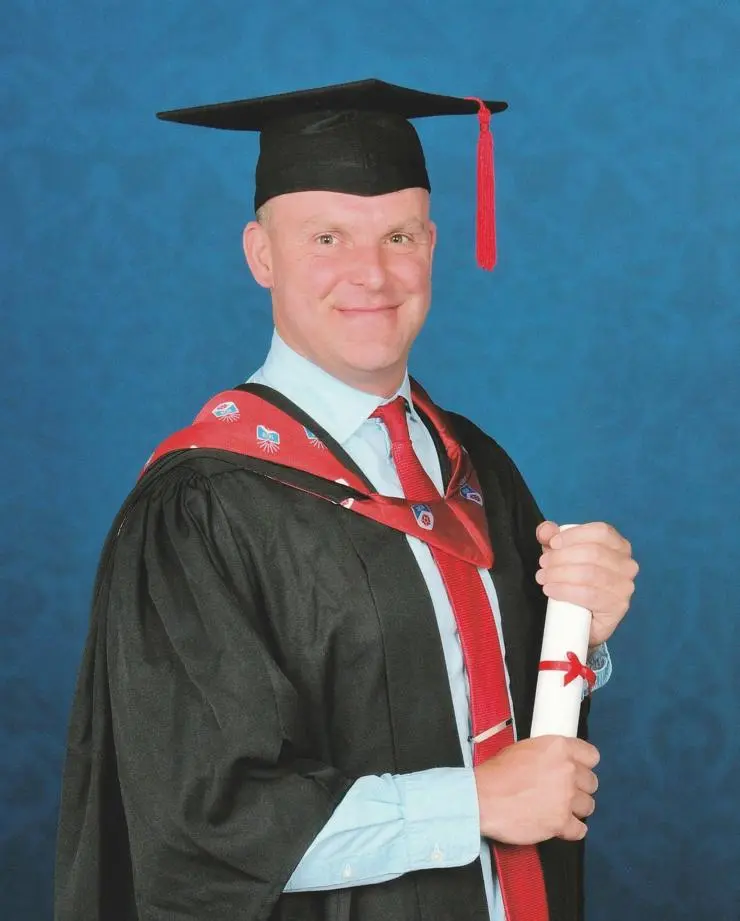From army to academic: an army veteran has become one of the first students to begin a postgraduate research degree in Psychology at Burnley. He is aiming to use his military experience to support other service personnel as they leave the forces and embark on the transition to civilian life.
Daniel Fort, 43, from Burnley, has begun a Postgraduate Research Degree in Psychology, becoming one of the first students to begin a PhD at the Burnley Campus.
Having left school with no qualifications, further education was not considered. Daniel explains, “I’m a kinaesthetic learner which means I need to be actively engaged in my learning. I didn’t do well at school because different learning styles were not considered. Therefore, the world of academia never really appealed to me. I left school with no qualifications and began low-skilled work as soon as I finished.”
“Burnley is a working-class town. There was an expectation that when you finish school, you go to work earn some money, and contribute to the family income. Or you go to college. The options were quite limited.”
After a couple of years working in factories, with a desire to see life outside of Burnley, Daniel was intrigued by an Army recruitment advert on the TV with the promise of an action-packed adventure. He said, “I was very naïve. I went down to the Army recruitment office and was promised all sorts. Believing it, I signed up there and then.”
“Because of my lack of qualifications, my job options were extremely limited. It was either the Para’s or the Infantry. As the guy who was recruiting me was also from Burnley, he strongly suggested I join my local regiment, the Queen’s Lancashire Regiment, which is now the Duke of Lancaster's Regiment. Upon completing my six-month training, I was sent to Omagh in Northern Ireland, just ten days before the bombing in August 1998. I’d only just turned 19, and although I’d had my training, the harsh reality of what my job entailed was totally different to what I imagined when I joined."

“Like many others, I went on to serve on operations in Iraq and Afghanistan before moving into training recruits. During my career, to progress up the ladder, one of the many requirements is to learn how to lead, teach, develop, and inspire others. As I practiced and developed my knowledge and experience, I acquired a collection of valuable skills. I became interested in the different methods of delivery behind learning and development. I always found it rewarding when I saw a lightbulb moment in the people that I was teaching and passing on knowledge.”
Father of three, Daniel’s sixteen-year career came to an unexpected end when he was medically discharged at short notice in 2013 due to the 2020 reduction policy requiring a substantial reduction in numbers. “I was expecting to serve my full 22 years and being at my sixteen-year point, was starting to look forward to my full pension, which meant not having to carry on working full time until retirement, so it was a big shock at first.”
“The army had understandably been a big part of my identity, so it was quite daunting transitioning back into civilian life unexpectedly. At first, I became an HGV driver, but it didn’t quite suit me. I wanted something more mentally stimulating and less stressful. I knew I had lots of transferable skills that I’d learnt in the army, and I’ve always taken great pride in my work, whatever it may be.”
“After a couple of years, I began working with children instructing them on 12-week intervention courses, doing things like basic military outdoor skills whilst incorporating military values. Things like teambuilding exercises, and physical training, fieldcraft skills, etc. They loved to get muddy and especially toasting marshmallows round a fire. It was similar what I’d done with the new recruits but with younger children, so I learned to adapt my methods and skills. It was great for children similar to how I was, in that they found being sat in a classroom all day unpleasant and they engaged and learned much more by learning outside. I found it really rewarding.”
"“I started this course so I can help support service personnel as they leave the forces and embark on the transition to civilian life.”"
— Daniel Fort, PhD Psychology Student
This position led Daniel into formal education. “After that role, I was offered a Teaching Assistant role in one of the schools. In this role, they started me on the journey to getting qualifications. I achieved a Maths, English and IT equivalent. After 20 years out of education, I seemed to prefer it a lot more this time. Probably because I wanted it rather than being forced to!”
This led to Daniel to college and then university. He explains, “I started studying Psychology at UCLan at the Burnley campus in 2019, but during my first year I realised that it was the counselling modules that I was most interested in as I wanted to help veterans' post-graduation. As such, in second year I moved across to the BSc (Hons) Psychology with Psychotherapy & Counselling course.
The attraction to counselling comes from a collection of tragic events throughout Daniel’s life. Daniel reflects, “In a short space of time, several close personal friends from the Army took their own life. It was hard. I felt like I only saw my friends at funerals and that something needed to be done to stop this from happening to veterans. It has been an ongoing issue for many years, but when it’s happening to people you know and care about, it makes it more personal. I wanted to be part of the bigger picture and try and make this tragic situation better. Therefore, my PhD is looking at the transition back into life after being in the forces, looking at addressing and reducing common veteran issues such as homelessness, addictions, incarcerations, and suicide.”
Remembering back to starting his university studies at Burnley, Daniel recalls feeling out of his depth, “When we started the work and hearing terminology I’d never heard before and learning how to input, analyse and interpret data, I wondered whether I was way out of my depth! But I stuck with it, I was committed to my goal and worked very hard, like I said, I take pride in my work so I did all the reading and learning I could to improve, I actually turned into a bit of a geek!”

Daniel graduated in June 2022 with a first-class degree with honours and was looking at starting a postgraduate course in integrative therapy. However, following a conversation with his lecturers Dr Debbie Pope and Dr Kat Cartmell, suggested the possibility of undertaking a PhD to Daniel. “Debbie and Kat were a major influence in my success on my course. They are great lecturers but also great people that go the extra mile for their students. When they mentioned a PhD on the back of my undergraduate success, initially I didn’t think I was capable as I still lack confidence, but their belief in me swayed the decision.”
“It’s an area that I am passionate about and have valuable personal experience of. It is also quite an under-researched area. By gaining a doctorate, I think that will enable me to achieve my goal of making a positive difference. The ultimate goal of my research is to collate enough evidence and understanding which can then be utilised to inform and make the necessary amendments to existing discharge policy. Currently, there is no psychological preparation or education about basic life skills prior to leaving, and there is no aftercare in place for service leavers when their time comes to an end. Veterans must rely on charities for help because aftercare is non-existent. I feel the responsibility lies with the Government to look after the people that served them. I am looking at the situation objectively, and don’t want to come across as a disgruntled veteran. I just want people to get a fair shot at life like anyone else does.”
Now ten years on from being discharged, Daniel began his full-time PhD in January 2023 and will run for three years, ending in January 2026, by which point he should be the first student to gain a doctorate degree at the Burnley Campus.
